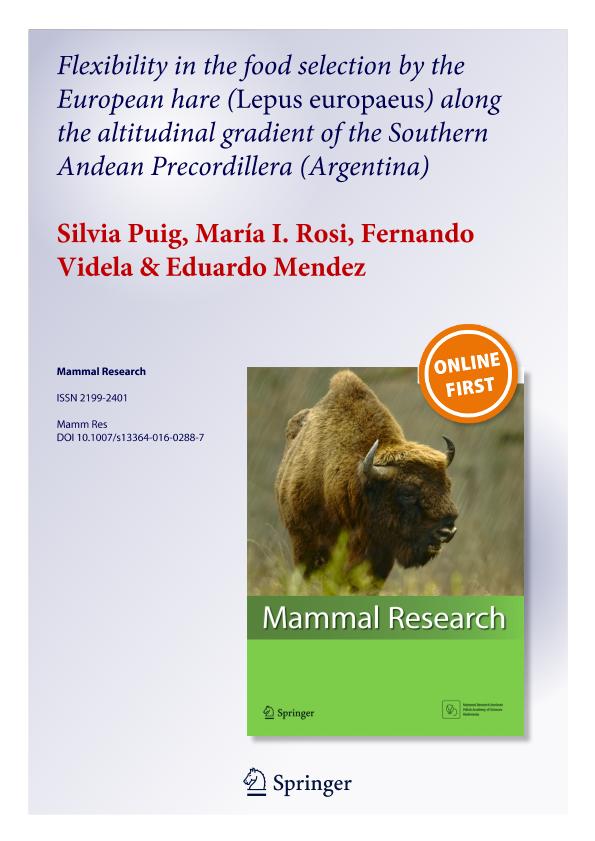Artículo
Flexibility in the food selection by the European hare (Lepus europaeus) along the altitudinal gradient of the Southern Andean Precordillera (Argentina)
Fecha de publicación:
01/2017
Editorial:
Springer
Revista:
Mammal Research
ISSN:
2199-2401
Idioma:
Inglés
Tipo de recurso:
Artículo publicado
Clasificación temática:
Resumen
Predictions derived from the optimal foraging theory are interesting to test on wild herbivores living in mountain environments, considering the expected vegetation changes across altitudinal gradients. A lower food richness and a more generalist diet are expected as altitude increases, with higher diet diversity and a shift to browsing as food availability decreases seasonally. With broad diets and ecological adaptability, Lepus europaeus is a non-native herbivore inhabiting Andean altitudinal gradients. Diet and vegetation were analyzed using microhistological analysis and point-quadrat transects at six sampling sites, representative of altitudinal phytogeographic belts. The diet included 67 of the 109 species present in the vegetation. Lepus europaeus proved to be an intermediate feeder with a generalist and selective diet. Following the prediction for altitudinal gradients, dietary generalism increased as plant cover and diversity decreased with altitude. Differences in plant phenology and toxins justified changes in food preferences, from shrubs at the summit to grasses at lower altitudes. Seasonal changes in diet diversity were consistent with different hypotheses depending on altitude. The tundra climate at the summit determined a strong phenological decline and food scarcity during winter, when the less diverse diet was more focused on a preferred shrub, following the selective quality hypothesis. With a milder climate at lower altitudes, the winter increase in diet diversity, with inclusion of avoided shrubs, agrees with the food abundance hypothesis. Climate severity, food shortage, plant phenology, and secondary compounds are relevant for explaining the feeding strategy of European hares in these mountain environments.
Archivos asociados
Licencia
Identificadores
Colecciones
Articulos(IADIZA)
Articulos de INST. ARG DE INVEST. DE LAS ZONAS ARIDAS
Articulos de INST. ARG DE INVEST. DE LAS ZONAS ARIDAS
Citación
Puig, Silvia; Rosi, Maria Irene; Videla, Fernando; Mendez, Eduardo; Flexibility in the food selection by the European hare (Lepus europaeus) along the altitudinal gradient of the Southern Andean Precordillera (Argentina); Springer; Mammal Research; 62; 1; 1-2017; 75-87
Compartir
Altmétricas




